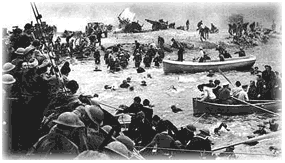“If our God whom we serve is able to deliver us from the furnace of blazing fire and out of your hand, O king, let him deliver us. But if not, be it known to you, O king, that we will not serve your gods and we will not worship the golden statue that you have set up.” – Daniel 3:16-18
Do miracles happen? I believe they do, but I leave that for you to decide.

A modern-day story of rescue, similar to the epic biblical account of the Israelites with the Red Sea at their backs and Pharaoh’s army blocking their escape, these brave soldiers were delivered back across the channel because of three simple words…but if not. And because of a citizenry devoted to their men in uniform, and the brave warriors committed to stopping the march of evil across Europe.
I pray that we Americans still possess such a measure of devotion.
The Rescue Story
On May 10, the German Panzer Division raced across Western Europe at lightning speed with superior firepower, a more unified command, and effective mobile armored forces. By May 12, they entered France and soon severed communication between the southern Allied force, and the much larger northern force. Having surrounded the Allies at Dunkirk, the German commander readied his army to attack when the unexpected happened.
Hitler, on the assurance of Hermann Goering, head of the Luftwaffe that his aircraft could destroy the armies stuck on the beaches, pulled back his ground troops. An act of providence? Again, you decide. What it created was enough time to initiate Operation Dynamo. Here’s where the story gets really interesting.
All of England awaited news that the British and French forces had been annihilated when the late-night code—but if not—was transmitted across the English airways by the British commander at Dunkirk. With no formal organization, the British Admiralty called on all English citizens with seaworthy vessels to lend their ships to an evacuation effort, while the Royal Air Force fought off the Luftwaffe. The civilian vessels ferried the soldiers to Royal Navy warships waiting at sea.
Churchill expected that only 20,000 to 30,000 of the combined forces could be saved, but these brave citizen rescuers pulled off one of the greatest miracles of the war.
“We

Leave A Comment